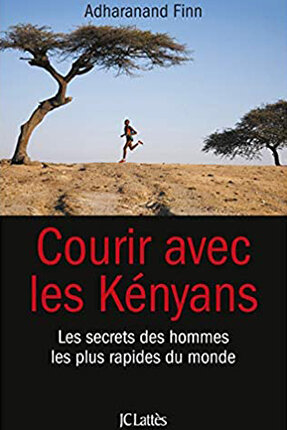Running with the Kenyans
Discovering the secrets of the fastest people on earth
After years of watching Kenyan athletes win the world’s biggest long-distance races, Adharanand Finn set out to discover what it was that made them so fast - and to see if he could keep up. Packing up his family, he moved to Iten, Kenya, the running capital of the world, and started investigating. Was it running barefoot to school, the food, the altitude, or something else? At the end of his journey he put his research to the test by running his first marathon, across the Kenyan plains.
Sunday Times Sports Book of the Year
Shortlisted for the William Hill Sports Book of the Year
Winner of Best New Writer at the British Sports Book Awards
EXCERPT FROM RUNNING WITH THE KENYANS:
| Prologue
I hear someone else’s alarm go first. I’ve been waiting for it, in my half-sleep. A shallow, impatient slumber under the thin sheet, the name of the hotel stamped across it in green ink. BOMEN. The light from the corridor makes the room visible. Bare walls. A dark pink colour in this light, but in the day an intoxicating bright peach. An energy-saving light bulb hangs from its wire above my head.
A phone rings. Godfrey, in the other bed a few feet away, answers it immediately, as though he’s been holding it in his hand, waiting for it to call. He speaks in calm, wakeful Kalenjin, and then hangs up.
‘Chris,’ he says in the darkness. He knows I’m awake. ‘You know Chris. He wants to go down for breakfast.’
My alarm starts off, buzzing on the bedside table. I reach over and turn it off. 4 a.m. Time to get up.
The hotel is a clatter of pots and pans and people talking. Some of the guests must be turning over in their beds and wondering what is going on, checking their watches. I head out along the corridor. The leaves of a palm tree bristle at one end. At the top of the stairs I meet Beatrice, standing in the shadows, unsure whether to go down. She smiles, her teeth white against her black skin.
‘Let’s go,’ I say.
Without replying, she follows me down.
In the dining room the waiters are ready. They’ve been pulled out of their beds in the middle of the night and pressed into their waiting suits. They don’t look pleased.
‘Tea, coffee?’ asks the head waiter, in his red waistcoat, holding a tray of pots and cups. We both shake our heads. I sit down at the table. Beatrice follows, sitting down opposite me. Outside the street is silent. I look at Beatrice.
‘Ready?’ I ask her.
She smiles. ‘I will make it,’ she says, nodding.
Japhet and Shadrack walk in to the room. Two young men in their early twenties. Neither of them has ever been this far from home. Japhet is all big toothy smiles, excited, while Shadrack looks permanently as though he has just seen something both shocking and incredible, his eyes pointed, bulging from his head. The head waiter is at the table with his tray.
‘Tea, coffee?’
‘Chai,’ says Shadrack so quietly he has to repeat it twice before the waiter understands. Japhet just nods. The waiter, pleased, pours out the tea.
‘You both feeling ready?’ I ask. Shadrack looks at me confused, as though I’ve just asked him if he has ever been in love.
‘We’re ready, yes,’ says Japhet, grinning. The waiter, on a roll now, brings us all a plate of fruit. Shadrack pokes his watermelon nervously with a fork and offers it to Beatrice. Then the waiter brings us all plates of bread and fried eggs.
‘Whatever you do,’ Godfrey told us the night before, ‘don’t eat eggs for breakfast.’ I look at the others.
‘You like eggs before a race?’ I ask them. But they’re already tucking in. I decide not to make a fuss, but I leave mine untouched. Two slices of bread and butter is enough. I eat up quickly and return upstairs to my room.
I had planned to go back to sleep after breakfast, but I’m too awake, so I pack up my bags and sit on the bed. My foot feels fine. I rub it to make sure, pressing my thumb into the sole where the injury was. I pull out a bottle of Menthol Plus, a balm from the pharmacy back in Iten. I rub it on my foot, then pull my socks on and sit back on the bed. Slow, deep breaths. An hour later, it’s time to go.
The dawn is casting a faint light across the parking lot as we all stand around beside the minibus, waiting for Godfrey. I left him combing his hair in the bedroom. He has a grade-one crew cut, but still spends five minutes combing it each morning. The others stand quiet, patient. Finally he turns up.
‘Sorry, guys,’ he says, sliding open the minibus doors. The junior members of the team, Japhet, Shadrack and Beatrice, climb in to the back of the bus. Chris, Paul and Philip, all veteran runners, take the middle row. And as the sole mzungu, white man, I’m given the front seat next to Godfrey, our trainer and driver.
We bump our way out of the drive and along the dirt street to the main, paved road. People are up walking around, herding goats, carrying large sacks across their shoulders. Crowded matatus, small buses, pull over and more people squeeze in. The day is already under way.
Inside our bus nobody speaks. Godfrey fiddles with the radio, but he already knows it doesn’t work. He drives on, the road straight, rising up along the edge of the savannah, which spreads out vast and empty on one side. On the other side are makeshift houses, small fields of maize, kiosks painted in bright colours advertising phone companies.
After about twenty minutes we reach the main entrance gate to Lewa, a 55,000-acre wildlife conservancy about 170 miles north of Nairobi. A long line of 4×4 cars is filing through. People are walking beside the road. We join the queue of traffic. The savannah spreads out on both sides now, filling the world. This is the classic African landscape. Dry grassy plains, dotted with spiky acacia trees.
In the back they’re all getting excited suddenly, pointing out of the window.
‘What is it?’ I ask.
‘Look,’ says Godfrey, pointing to one side, where an elephant is standing, as still as a statue, just a few feet away.
‘Is it real?’ Philip asks, craning over my shoulder to see.
We bump on through the clouds of dust from the other cars. The elephant has lightened the mood in the bus. Godfrey starts out on his pep talk.
‘OK, guys. Here we are. I know we have a winner in this car. You’ve all done the training, now it’s time to run. Remember that this is a marathon. You mustn’t go too fast at the beginning. But you need to stay in touch with the leaders. You know you can do it.’
Godfrey pulls the bus to a halt. Even though it’s still barely past 6 a.m., hundreds of people stand lined up behind a rope, being pushed back by security guards. Runners in shorts and vests, numbers pinned to their chests, are streaming along the track towards the start. Before I know it everyone is out of the bus and has disappeared.
‘They’ve gone straight to the start,’ says Godfrey. ‘You go, I’ll meet you there.’ It’s already warm, so I strip off my tracksuit and throw it in the bus. Underneath is my yellow vest. My number, 22, is pinned to the front. Along the back are the words Iten Town Harriers.
The start is buzzing with over a thousand runners. Among the melee I spot a group of yellow vests, the rest of the team. They’re with my wife, Marietta, and my two-year-old son, Ossian. She’s waiting for me so she can take a group photograph.
We huddle together. Godfrey doesn’t want to be in the picture, but we haul him over. We couldn’t have done this without him. He stands at the back, his face lost under the shadow of his hat.
‘OK, thank you,’ says Marietta, releasing us from our pose. ‘Good luck.’ And with that we’re lining up. We all shake hands, but there’s nothing left to say. This is it. Months of training on the line. The wild plains of Africa lying before us. Waiting. Still. Helicopters hover overhead. The man with the microphone doesn’t say it, but we’re waiting for some lions to move off the course. The helicopters are swooping low over them, trying to force them on. It seems a long time to stand there. I stretch my arms. Twenty-six miles. Forty-two kilometres. But they’re just numbers. One step at a time. One breath at a time. The morning heat rising from the spiky grass. My children, big smiley faces, waving at me from the side. And then we’re counting. Five. I feel my breath filling me with life. Four. People hold their watches, crouching. Three. Two. This is it. One. Go.

























